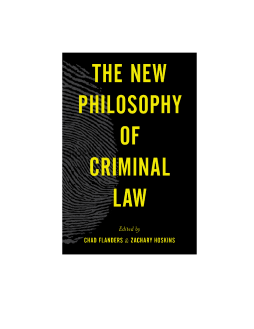
Additional Information
Book Details
Abstract
There is no more vivid example of a state’s power over its citizens than the criminal law. By criminalizing various behaviours, the state sets boundaries on what we can and cannot do. And the criminal law is in many ways unique in the harshness of its sanctions. But traditional criminal law theory has for too long focussed on the questions, “what is a crime?” and “what is the justification of punishment?” The significance of the criminal law extends beyond these questions; indeed, critical philosophical questions underlie all aspects of the criminal justice system. The criminal law engages us not just as offenders or potential offenders, but also as victims, suspects, judges and jurors, prosecutors and defenders—and as citizens.
The authors in this volume go beyond traditional questions to challenge our conventional understandings of the criminal law. In doing so, they draw from a number of disciplines including philosophy, history, and social science.
Chad Flanders and Zachary Hoskins have lined-up an all-star cast of leading authors to address some of the most theoretically vexing and practically pressing questions in criminal law. The New Philosophy of Criminal Law is an excellent collection that will be of great interest to all of us who work in this area.
Kit Wellman, Professor of Philosophy at Washington University St. Louis
Chad Flanders is Associate Professor of Law at Saint Louis University School of Law.
Zachary Hoskins is Assistant Professor of Philosophy at the University of Nottingham.
Contributors:
Christopher Bennett, Senior Lecturer in Philosophy, University of Sheffield; Vincent Chiao, Assistant Professor of Law, University of Toronto; Jovana Davidovic, Assistant Professor of Philosophy, University of Iowa; R. A. Duff, Professor and Russell M. and Elizabeth M. Bennett Chair in Excellence, University of Minnesota School of Law; Stuart Green, Distinguished Professor of Law and Nathan L. Jacobs Scholar, Rutgers School of Law; Douglas Husak, Professor of Philosophy, Rutgers University; Joshua Kleinfeld, Associate Professor of Law, Northwestern University School of Law and Affiliated Faculty, Department of Philosophy, Northwestern University; Richard L. Lippke, Professor of Criminal Justice, Indiana University; Arlie Loughnan, Associate Professor of Law, University of Sydney; S. E. Marshall, Professor Emeritus, University of Stirling; Alice Ristroph, Professor, Seton Hall School of Law; Mary Sigler, Professor and Willard H. Pedrick Distinguished Research Scholar, Arizona State University College of Law
Even if the rules that send people to prison are each individually defensible, what happens when those rules create a system that produces far too many crimes and far too many people in prison for far too long? The “new philosophy of criminal law” is new because it puts such systemic questions front and center. The contributors to this volume are as internationally distinguished as their interdisciplinary contributions are timely and compelling.
Stephen P. Garvey, Professor of Law at Cornell Law School
The New Philosophy of Criminal Law explores some important trends in the contemporary philosophy of criminal law … [the volume] serves as a valuable reminder that, although philosophy as a discipline often can be detached from real world issues, it must not necessarily be so. Thus, this fine work will serve as a valuable resource for criminal law scholars and professionals.
